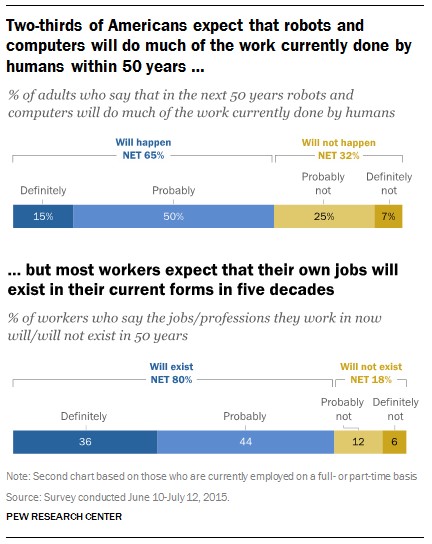I often talk about how robots are changing the workplace (For example here, and here) because it's a topic that hits close to home.
I remember, back in the late 90's, starting to trade based on my knowledge and my insights (and feeling like I had an edge). By 2003, most of my trading was automated. But, I wouldn't have believed how much of today's daily volume is now traded by computers.
Likewise, I remember the tech bubble and recognizing that more businesses were going online. But, I wouldn't have believed what the Internet did to retail, music, TV, banking (face it, to Business and the World in general).
Could it take your job as well?
Most don't think so.
via Pew Research
Interesting.
People are not good at recognizing their biases.
For example, take "Fake News" or the recent claims from Trump that Obama wiretapped him.
It turns out, people consistently underestimate their susceptibility to fake news – especially if the story favors their preferred candidate.
In the case of wiretapping – despite no credible evidence of wiretapping and the heads of the FBI and NSA categorically denying that Obama ordered wiretapping of Trump Tower - 47% of American and 74% of Republicans believe it's likely that Trump was wiretapped during the campaign
Regardless of the veracity of the statement, it's evidence that we have a tendency to think emotionally, and aren't always great at rationally analyzing facts.
As proof that it's everyone, the week after the election, many Democrats believed the economy had already worsened.
Roddy Roediger is a leading expert in learning and memory, and he says there are 3 key principles that make false information believable:
- Plausibility;
- Suggestions and innuendo can be just as convincing as assertions; and
- The more we engage with the lie, the more we misremember.
Good thing we're not biased … Right?


